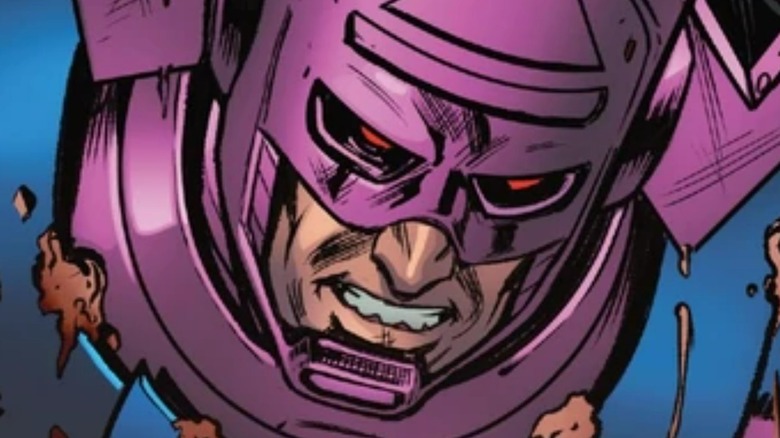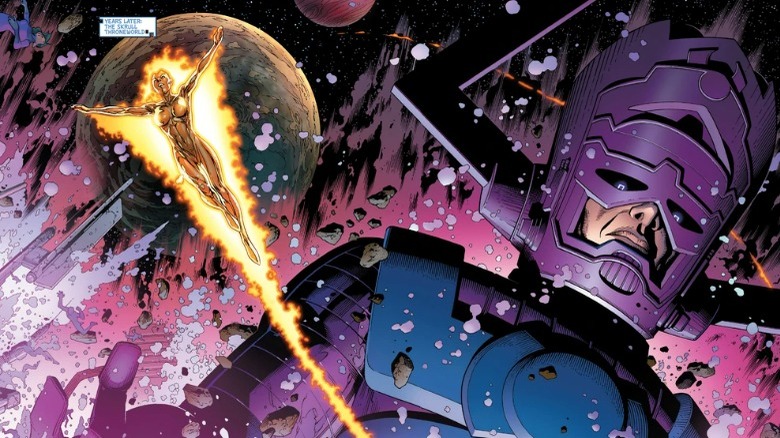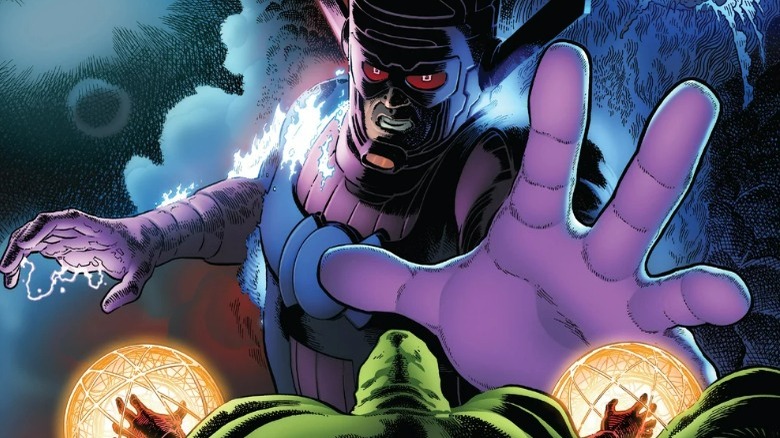Galactus' Powers In The Marvel Universe Explained
The villains of the Marvel universe have proven just as integral to the success of Marvel Comics as their heroic counterparts. The likes of Doctor Doom, Green Goblin, Thanos, and countless others are recognized as pop culture icons these days, despite their desire to take over the world or enact universe-wide destruction. At the same time, when talking about infamous Marvel rogues, it becomes abundantly clear that in terms of power level, they're not all created equal. Some are tough, some are cunning, some are dangerous, yet they're all a threat to the good guys in some way.
And then there's Galactus.
Created by comic book legends Stan Lee and Jack Kirby, Galactus debuted on the pages of "Fantastic Four" #48 from December of 1965. Born in the sixth version of the multiverse as a humanoid named Galan, his homeworld of Taa found itself in danger thanks to a cataclysmic cosmic event known as the Big Crunch. Miraculously, he survived it thanks to his merging with the personification of the Sixth Cosmos, which turned him into the being known as Galactus. In this form, he'd go on to become quite the thorn in the side of various Marvel heroes, putting his remarkable powers to effective use.
Speaking of Galactus' staggering extraterrestrial abilities, here's what you need to know about them.
Galactus boasts the near-limitless Power Cosmic
As Galactus, Galan of Taa has the fabled Power Cosmic at his fingertips, meaning he's a being of near-unlimited power. Not only does the Power Cosmic imbue him with knowledge of the universe beyond compare, and act as a bargaining chip for his Heralds — beings who help locate planets for Galactus to devour (hence his "Devourer of Worlds" nickname), often in exchange for some of the Power Cosmic –, but it grants him a laundry list of abilities that have made defeating him no easy feat for the Fantastic Four, Thor, and more in the decades since his print debut.
First and foremost, Galactus has the ability to alter his physical size at will and levitate in the vacuum of space, making it easier for him to absorb the Life Force of planets and stars. With his largely unmatched power at its full might, he can manipulate matter to his will, emit impenetrable force fields, open wormholes to virtually any destination, teleport, create beings out of thin air, and even resurrect dead ones with ease. He's also incredibly strong, durable, and impervious to disease and all toxins, in addition to being a skilled telepath. Talk about stacking the deck.
How does one defeat Galactus?
With all of that in mind, it's plain to see why many in the Marvel universe consider Galactus to be one of the most formidable and terrifying entities in the cosmos. He's essentially all-knowing, equipped with nearly every ability one could ever need, limited only by his own imagination, and if you want to win, he's pretty much impossible to take on in a one-on-one fight. However, that's not to say that Galactus is impossible to defeat, seeing as it has happened many times. As it turns out, the one thing that has come to define him is actually his greatest weakness: his hunger.
Unsurprisingly, wielding such a vast array of abilities doesn't come without a cost, so, as touched on earlier, Galactus has to keep his energy up by snacking on the Life Force of planets and stars. Otherwise, his strength will wane, and it will take more and more exertion for him to use his powers. The titular team and several companions took full advantage of this in "Fantastic Four" Vol. 1 #243, where Galactus attempted to devour Earth's Life Energy. After a brief battle and some classic Doctor Strange magic, they managed to topple the hungry villain before it was too late.
Galactus will go down in history among the most memorable Marvel Comics antagonists of all time. Though one could easily attribute that status to his funky costume or the stories he took part in, his extensive list of powers deserves a fair bit of the credit too.


